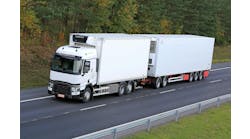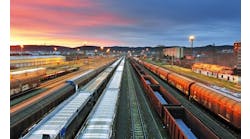The Ninth Circuit US Court of Appeals unanimously held that the California lower court erred when it denied a request by the American Trucking Associations (ATA) seeking a preliminary injunction to block the adoption of concession programs contained in the Clean Truck Program at the Ports of Los Angeles and Long Beach.
In the earlier decision, US District Court Judge Christina Snyder cited security in her support of the concession requirements contained in the plan. Ostensibly a clean air initiative, the plan called for drivers picking up and delivering loads to the ports being employees of companies that are granted concession rights at the ports. This has sparked concerns that the largely independent pool of drivers would be replaced by unionized, company drivers.
The Appeals Court said the safety regulations the lower court had equated to security in order to justify an exception to federal law were not valid. The security exception would allow such local regulations and was used by the lower court to justify denying the ATA-requested injunction.
The American Trucking Associations, supported by the Intermodal Motor Carriers Conference, previously argued that the concession programs “unlawfully re-regulate the port trucking industry to the detriment of motor carriers, shippers, businesses and consumers that depend on the products that are handled at those ports.”
At the time it filed the brief, ATA President and CEO Bill Graves said, referring to bills passed into law to deregulate the motor carrier industry, “The Port of Los Angeles’ further intrusion into the competitive structure of the drayage market makes the ATA lawsuit even more important and illustrates precisely the type of disruption of trucking services in the economy that Congress found so inefficient and disruptive. Creating an artificial, non-competitive market with highly inflated costs and prices hinders our national competitive ability and sets a dangerous precedent.”
The Appeals Court ruling, issued March 20th, outlined key areas the lower court should have taken into consideration in granting the trucking group's motion, said the National Industrial Transportation League (NITL). Among those issues was an argument set forth in an amicus curiae brief filed by NITL opposing the concession agreements because they would unlawfully regulate “prices, routes and services” of trucking companies and substantially interfere with international maritime commerce. That language parallels restrictions in deregulation legislation and supported by a US Supreme Court ruling in Rowe vs. the New Hampshire Motor Transport Association which said, in that case, public health was not sufficient grounds to allow an exemption to the federal laws that prohibit states from regulating prices, routes and services of motor carriers.
The Ninth Circuit Court of Appeals, in reversing the lower court decision, instructed that court to issue an appropriate preliminary injunction and to proceed as quickly as possible so the ATA will not suffer unnecessary harm from any unintentional provisions.
The Coalition for Clean and Safe Ports, was quick to issue a statement expressing “outrage at the nation's largest trucking lobby's repeated efforts to kill a pair of critical clean air programs….” The coalition, which claims 40 public health, environmental, community, labor and faith-based organizations, vowed to use every legal and political option to prevent the efforts of the ATA.
Related Articles
| Current ruling: | • Federal Maritime Commission to Seek Ports Injunction | |
| Clean air provisions: | • Pacer and Penney Support Clean Ports | • LA Issues Incentives to Truckers |
| •Rowe vs. New Hampshire Motor Transport Association: | • Defending Transportation Deregulation | • Judicial Smackdown |
On its October 1, 2008, launch date, the Clean Truck Program immediately banned trucks built before 1989 from hauling cargo in and out of cargo terminals at the ports of Los Angeles and Long Beach. By 2012, the Program would bar from the port complex any truck that doesn’t meet the cleanest 2007 emission standards.
Earlier this year, the Port of Los Angeles (http://www.portoflosangeles.org) began the process of distributing an estimated $44 million in incentive checks to its Clean Truck Program (CTP) concessionaires that have already committed to deploying new, privately funded clean trucks into drayage service in advance of CTP schedule requirements.
J.C. Penney Company, Inc. and the PDS Trucking, Inc. subsidiary of Pacer Distribution Services, Inc., were among companies taking major steps to convert 100% of the truck fleet handling JCPenney imports at the ports of Los Angeles and Long Beach to low-emissions, clean-diesel technology. The companies announced the delivery of more than 20 new Kenworth T-800 tractors that would replace aging diesel trucks in use by independent owner-operators in Pacer’s port network.
Los Angeles Mayor Antonio Villaraigosa noted in his response to the most recent court ruling, “While the District Court has been asked to undertake further proceedings with respect to the case, the City of Los Angeles is pleased that the centerpiece components of the Clean Truck Program that are currently in effect— i.e., the dirty truck ban and clean truck fee—remain intact for the benefit of thousands of Southern Californians who are already breathing cleaner air less than six months after the Clean Truck Program’s implementation.”
The mayor continued, saying, “Our Clean Truck Program is reducing toxic port truck pollution at an accelerated pace, and today’s ruling by the Ninth Circuit Court of Appeals does not challenge the truck ban schedule or truck fees that are helping us successfully battle this health crisis. We are committed to fighting this case because our Clean Truck Program is the most sustainable plan for ensuring a clean, safe and secure trucking system for the long-haul at the Port of Los Angeles.”


